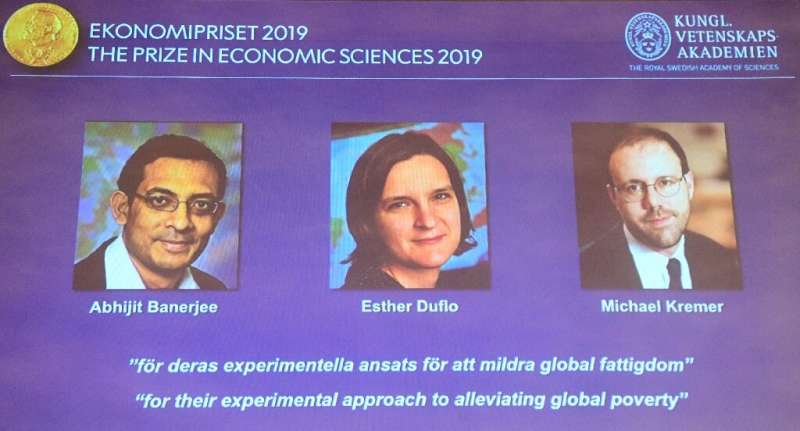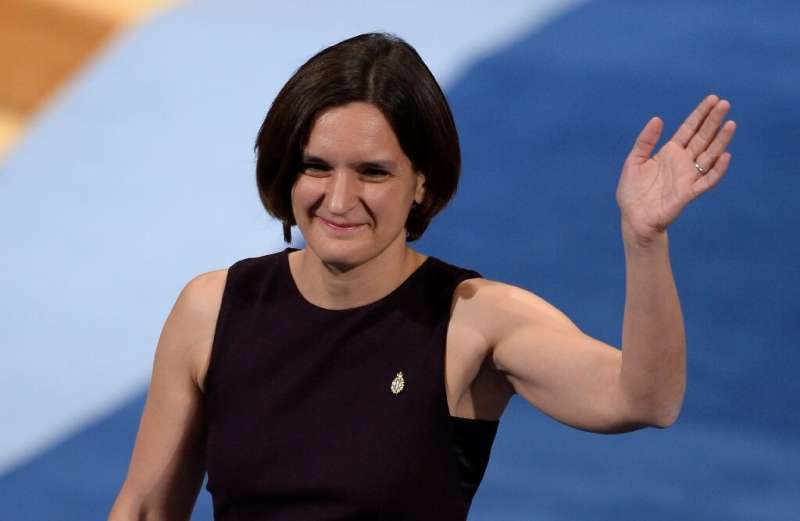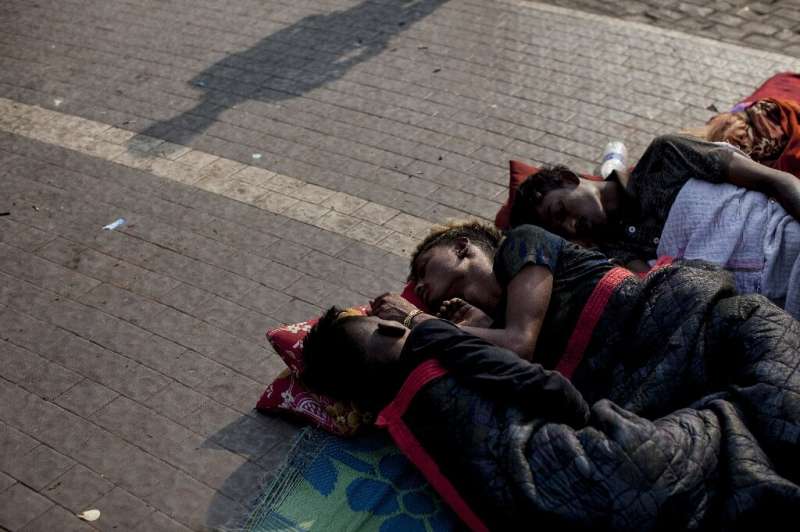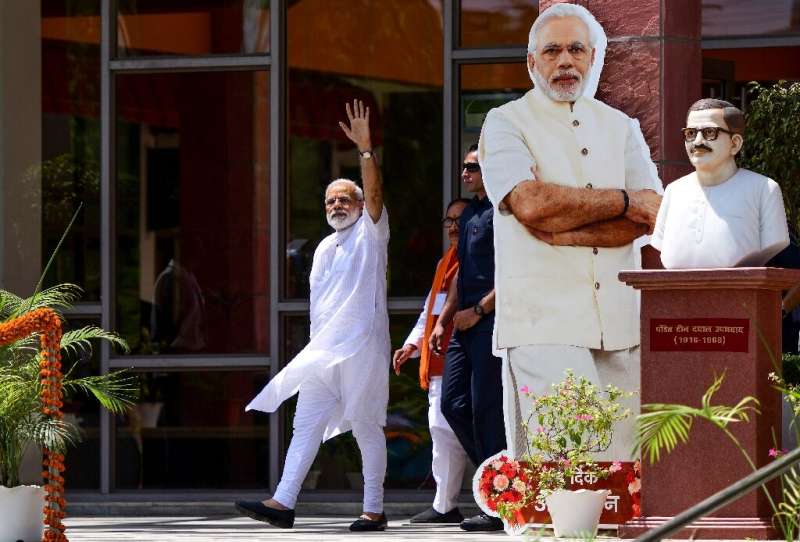Trio win Nobel Economics Prize for work on poverty

A trio of Americans on Monday won the Nobel Economics Prize for their work in the fight against poverty, including Esther Duflo, the youngest-ever economics laureate and only the second woman to win the prize.
Duflo—a 46-year-old French-American professor who has served as an advisor to ex-US president Barack Obama—shared the Nobel with her husband, Indian-born Abhijit Banerjee and fellow American Michael Kremer "for their experimental approach to alleviating global poverty," the Royal Swedish Academy of Sciences said.
"This year's laureates have introduced a new approach to obtaining reliable answers about the best ways to fight global poverty," the jury said.
The science academy said that "more than 700 million people still subsist on extremely low incomes", and that around five million children under the age of five still die every year from preventable or curable diseases.
The trio found efficient ways of combating poverty by breaking down difficult issues into smaller, more manageable questions, which can then be answered through field experiments, the jury said.
Duflo is only the second woman to win the Nobel Economics Prize in its 50-year existence, following American Elinor Ostrom in 2009.
Ultra rich, ultra poor

Banerjee and Duflo are professors at the Massachusetts Institute of Technology (MIT), while Kremer is a professor at Harvard University, all based in Boston.
Duflo has made her name conducting research, together with her husband, who was her PhD supervisor, on poor communities in India and Africa, seeking to weigh the impact of policies such as incentivising teachers to show up for work or measures to empower women.
Her tests, which have been likened to clinical trials for drugs, seek to identify and demonstrate which investments are worth making and have the biggest impact on the lives of the most deprived.
"Economics have a lot to say why the times are hard and what to do about it," Duflo said at a press conference at MIT in Boston.
"The two groups that did relatively well in the world economy are the ultra-rich and the ultra-poor."
But she noted that even when basic material comforts are covered for people in developed economies "their full life might have the same level of misery and unhappiness that some of the extremely poor people we study."
Banerjee said governments have not taken seriously the harm inflicted from globalisation.
"The policy response to the pain caused by globalisation was inadequate often been the wrong direction," he said.

Not enough women
Duflo told the Nobel committee in a phone interview that she didn't think it was possible to win the prize "before being significantly older than any of the three of us."
Banerjee is 58 and Kremer is 54.
Addressing the fact that so few female economists have been honoured, Duflo said this was also a reflection of the field in general.
"There are not enough women in the economics profession period, so you see this problem at all levels," Duflo told the Nobel Prize website.
In the past 20 years, more than three-quarters of economics laureates have been American white males over the age of 55.
French President Emmanuel Macron hailed the "magnificent" Nobel awarded to Duflo, writing on Twitter that her work "shows that research in this field can have a concrete impact on the well-being of humanity".

Duflo said her husband and fellow laureate had "gone back to sleep" after receiving the call from the academy.
Banerjee in a later interview confessed he was not "an early morning person".
But he said he was "delighted" that research into alleviating poverty had received some attention.
The son of two economists, Banerjee grew up in Kolkata in eastern India, and has been a vocal critic of Indian Prime Minister Narendra Modi.
Ahead of elections earlier this year—that saw Modi cruise to a second term—Banerjee advised the opposition Congress party on its proposed guaranteed basic income guarantee scheme for tens of millions of India's poorest.
In the 1990s, Kremer used field experiments to test interventions to improve school results in western Kenya.
He has also helped develop programmes to incentivise the distribution of vaccines for diseases in the developing world.

Only Nobel not in will
Unlike the other Nobels awarded since 1901, the Economics Prize was not created by the prizes' founder, philanthropist and dynamite inventor Alfred Nobel, in his 1895 will. It was created in 1968 to mark the 300th anniversary of Sweden's central bank, and first awarded in 1969.
Each of the Nobels comes with a prize sum of nine million Swedish kronor ($914,000, 833,000 euros), to be shared if there is more than one winner in the discipline.
But unluckily for recent winners, the prize's value has lost around $185,000 in the past two years, due to the depreciation of the Swedish krona.
This year's Nobel laureates will receive their awards at ceremonies in Stockholm and Oslo on December 10, the anniversary of the 1896 death of Alfred Nobel.
Press release: The Prize in Economic Sciences 2019
The Royal Swedish Academy of Sciences has decided to award the Sveriges Riksbank Prize in Economic Sciences in Memory of Alfred Nobel 2019 to
Abhijit Banerjee
Massachusetts Institute of Technology, Cambridge, USA
Esther Duflo
Massachusetts Institute of Technology, Cambridge, USA
Michael Kremer
Harvard University, Cambridge, USA
"for their experimental approach to alleviating global poverty"
Their research is helping us fight poverty
The research conducted by this year's Laureates has considerably improved our ability to fight global poverty. In just two decades, their new experiment-based approach has transformed development economics, which is now a flourishing field of research.
Despite recent dramatic improvements, one of humanity's most urgent issues is the reduction of global poverty, in all its forms. More than 700 million people still subsist on extremely low incomes. Every year, around five million children under the age of five still die of diseases that could often have been prevented or cured with inexpensive treatments. Half of the world's children still leave school without basic literacy and numeracy skills.
This year's Laureates have introduced a new approach to obtaining reliable answers about the best ways to fight global poverty. In brief, it involves dividing this issue into smaller, more manageable, questions – for example, the most effective interventions for improving educational outcomes or child health. They have shown that these smaller, more precise, questions are often best answered via carefully designed experiments among the people who are most affected.
In the mid-1990s, Michael Kremer and his colleagues demonstrated how powerful this approach can be, using field experiments to test a range of interventions that could improve school results in western Kenya.
Abhijit Banerjee and Esther Duflo, often with Michael Kremer, soon performed similar studies of other issues and in other countries. Their experimental research methods now entirely dominate development economics.
The Laureates' research findings – and those of the researchers following in their footsteps – have dramatically improved our ability to fight poverty in practice. As a direct result of one of their studies, more than five million Indian children have benefitted from effective programmes of remedial tutoring in schools. Another example is the heavy subsidies for preventive healthcare that have been introduced in many countries.
These are just two examples of how this new research has already helped to alleviate global poverty. It also has great potential to further improve the lives of the worst-off people around the world.
Research to help the world's poor
What is the best way to design measures that reduce global poverty? Using innovative research based on field experiments, Abhijit Banerjee, Esther Duflo and Michael Kremer have laid the foundation for answering this question that is so vital to humanity.
Over the last two decades, people's living standards have noticeably improved almost everywhere in the world. Economic wellbeing (measured as GDP per capita) doubled in the poorest countries between 1995 and 2018. Child mortality has halved relative to 1995, and the proportion of children attending school has increased from 56 to 80 per cent.
Despite this progress, gigantic challenges remain. Over 700 million people still subsist on extremely low incomes. Every year, five million children still die before their fifth birthday, often from diseases that could be prevented or cured with relatively cheap and simple treatments. Half of the world's children still leave school without basic literacy and numeracy skills.
A new approach to alleviating global poverty
In order to combat global poverty, we must identify the most effective forms of action. This year's Laureates have shown how the problem of global poverty can be tackled by breaking it down into a number of smaller – but more precise – questions at individual or group levels. They then answer each of these using a specially designed field experiment. Over just twenty years, this approach has completely reshaped research in the field known as development economics. This new research is now delivering a steady flow of concrete results, helping to alleviate the problems of global poverty.
There has long been an awareness of the huge differences in average productivity between rich and poor countries. However, as Abhijit Banerjee and Esther Duflo have noted, productivity differs greatly, not only between rich and poor countries but also within poor countries. Some individuals or companies use the latest technology, while others (which produce similar goods or services) use outdated means of production. The low average productivity is thus largely due to some individuals and companies falling behind. Does this reflect a lack of credit, poorly designed policies, or that people find it difficult to make entirely rational investment decisions? The research approach designed by this year's Laureates deals with exactly these types of questions.
Early field experiments in schools
The Laureates' very first studies examined how to deal with problems relating to education. Which interventions increase educational outcomes at the lowest cost? In low-income countries, textbooks are scarce and children often go to school hungry. Would pupils' results improve if they had access to more textbooks? Or would giving them free school meals be more effective? In the mid-1990s, Michael Kremer and his colleagues decided to move part of their research from their universities in the north-eastern US to rural western Kenya in order to answer these kinds of questions. They performed a number of field experiments in partnership with a local non-governmental organisation (NGO).
Why did the researchers choose to use field experiments? Well, if you want to examine the effect of having more textbooks on pupils' learning outcomes, for example, simply comparing schools with different access to textbooks is not a viable approach. The schools could differ in many ways: wealthier families usually buy more books for their children, grades are probably better in schools where fewer children are really poor, and so on. One way of circumventing these difficulties is to ensure that the schools being compared have the same average characteristics. This can be achieved by letting chance decide which schools are placed in which group for comparison – an old insight that underlies the long tradition of experimentation in the natural sciences and medicine. In contrast to traditional clinical trials, the Laureates have used field experiments in which they study how individuals behave in their everyday environments.
Kremer and his colleagues took a large number of schools that needed considerable support and randomly divided them into different groups. The schools in these groups all received extra resources, but in different forms and at different times. In one study, one group was given more textbooks, while another study examined free school meals. Because chance determined which school got what, there were no average differences between the different groups at the start of the experiment. The researchers could thus credibly link later differences in learning outcomes to the various forms of support. The experiments showed that neither more textbooks nor free school meals made any difference to learning outcomes. If the textbooks had any positive effect, it only applied to the very best pupils.
Later field experiments have shown that the primary problem in many low-income countries is not a lack of resources. Instead, the biggest problem is that teaching is not sufficiently adapted to the pupils' needs. In the first of these experiments, Banerjee, Duflo et al. studied remedial tutoring programmes for pupils in two Indian cities. Schools in Mumbai and Vadodara were given access to new teaching assistants who would support children with special needs. These schools were ingeniously and randomly placed in different groups, allowing the researchers to credibly measure the effects of teaching assistants. The experiment clearly showed that help targeting the weakest pupils was an effective measure in the short and medium term.
These early studies in Kenya and India were followed by many new field experiments in other countries, focusing on important areas such as health, access to credit, and the adoption of new technology. The three Laureates were at the forefront of this research. Due to their work, field experiments have become development economists' standard method when investigating the effects of measures to alleviate poverty.
Field experiments linked to theory
Well-designed experiments are highly reliable – they have internal validity. This method has been extensively used in traditional clinical trials for new pharmaceuticals, which have specially recruited participants. The question has often been whether or not a particular treatment has a statistically significant effect.
The experiments designed by this year's Laureates have two distinctive features. First, the participants made actual decisions in their everyday environments, both in the intervention group and in the control group. This meant that the results of testing a new policy measure, for example, could often be applied on site.
Second, the Laureates relied on the fundamental insight that much of what we want to improve (such as educational outcomes) reflects numerous individual decisions (for example among pupils, parents and teachers). Sustainable improvements thus require an understanding of why people make the decisions they do – the driving forces behind their decisions. Banerjee, Duflo, and Kremer not only tested whether a certain intervention worked (or not), but also why.
To study the incentives, restrictions and information that motivated the participants' decisions, the Laureates used the contract theory and behavioural economics that were rewarded with the Prize in Economic Sciences in 2016 and 2017, respectively.
Generalising results
One key issue is whether experimental results have external validity – in other words, whether the results apply in other contexts. Is it possible to generalise the results of experiments in Kenyan schools to Indian schools? Does it make a difference if a specialised NGO or a public authority administers a particular intervention designed to improve health? What happens if an experimental intervention is scaled up from a small group of individuals to include more people? Does the intervention also affect individuals outside the intervention group, because they are crowded out from access to scarce resources or face higher prices?
The Laureates have also been at the forefront of research on the issue of external validity and developed new methods that consider crowding-out effects and other spillover effects. Closely linking experiments to economic theory also increases opportunities for results to be generalised, as fundamental patterns of behaviour often have a bearing on wider contexts.
Concrete results
Below, we provide a few examples of specific conclusions drawn from the type of research initiated by the Laureates, with the emphasis on their own studies.
Education: We now have a clear perspective on the core problems in many poor country's schools. Curricula and teaching do not correspond to pupils' needs. There is a high level of absenteeism among teachers and educational institutions are generally weak.
The abovementioned study by Banerjee, Duflo, et al. showed that targeted support for weak pupils had strong positive effects, even in the medium term. This study was the start of an interactive process, in which new research results went hand in hand with increasingly large-scale programmes to support pupils. These programmes have now reached more than 100,000 Indian schools.
Other field experiments investigated the lack of clear incentives and accountability for teachers, which was reflected in a high level of absenteeism. One way of boosting the teachers' motivation was to employ them on short-term contracts that could be extended if they had good results. Duflo, Kremer et al. compared the effects of employing teachers on these terms with lowering the pupilteacher ratio by having fewer pupils per permanently employed teacher. They found that pupils who had teachers on short-term contracts had significantly better test results, but that having fewer pupils per permanently employed teacher had no significant effects.
Overall, this new, experiment-based research on education in low-income countries shows that additional resources are, in general, of limited value. However, educational reforms that adapt teaching to pupils' needs are of great value. Improving school governance and demanding responsibility from teachers who are not doing their job are also cost-effective measures.
Health: One important issue is whether medicine and healthcare should be charged for and, if so, what they should cost. A field experiment by Kremer and co-author investigated how the demand for deworming pills for parasitic infections was affected by price. They found that 75 per cent of parents gave their children these pills when the medicine was free, compared to 18 per cent when they cost less than a US dollar, which is still heavily subsidised. Subsequently, many similar experiments have found the same thing: poor people are extremely price-sensitive regarding investments in preventive healthcare.
Low service quality is another explanation why poor families invest so little in preventive measures. One example is that staff at the health centres that are responsible for vaccinations are often absent from work. Banerjee, Duflo et al. investigated whether mobile vaccination clinics – where the care staff were always on site – could fix this problem. Vaccination rates tripled in the villages that were randomly selected to have access to these clinics, at 18 per cent compared to 6 per cent. This increased further, to 39 per cent, if families received a bag of lentils as a bonus when they vaccinated their children. Because the mobile clinic had a high level of fixed costs, the total cost per vaccination actually halved, despite the additional expense of the lentils.
Bounded rationality: In the vaccination study, incentives and better availability of care did not completely solve the problem, as 61 per cent of children remained partially immunised. The low vaccination rate in many poor countries probably has other causes, of which one is that people are not always completely rational. This explanation may also be key to other observations which, at least initially, appear difficult to understand.
One such observation is that many people are reluctant to adopt modern technology. In a cleverly designed field experiment, Duflo, Kremer et al. investigated why smallholders – particularly in subSaharan Africa – do not adopt relatively simple innovations, such as artificial fertiliser, although they would provide great benefits. One explanation is present bias – the present takes up a great deal of people's awareness, so they tend to delay investment decisions. When tomorrow comes, they once again face the same decision, and again choose to delay the investment. The result can be a vicious circle in which individuals do not invest in the future even though it is in their long-term interest to do so.
Bounded rationality has important implications for policy design. If individuals are present-biased, then temporary subsidies are better than permanent ones: an offer that only applies here and now reduces incentives to delay investment. This is exactly what Duflo, Kremer et al. discovered in their experiment: temporary subsidies had a considerably greater effect on the use of fertiliser than permanent subsidies.
Microcredit: Development economists have also used field experiments to evaluate programmes that have already been implemented on a large scale. One example is the massive introduction of microloans in various countries, which has been the source of great optimism.
Banerjee, Duflo et al. performed an initial study on a microcredit programme that focused on poor households in the Indian metropolis of Hyderabad. Their field experiments showed rather small positive effects on investments in existing small businesses, but they found no effects on consumption or other development indicators, neither at 18 nor at 36 months. Similar field experiments, in countries such as Bosnia-Herzegovina, Ethiopia, Morocco, Mexico and Mongolia, have found similar results.
Policy influence
The Laureates' work has had clear effects on policy, both directly and indirectly. Naturally, it is impossible to precisely measure how important their research has been in shaping policies in various countries. However, it is sometimes possible to draw a straight line from research to policy.
Some of the studies we have already mentioned have indeed had a direct impact on policy. The studies of remedial tutoring eventually provided arguments for large-scale support programmes that have now reached more than five million Indian children. The deworming studies not only showed that deworming provides clear health benefits for schoolchildren, but also that parents are very price-sensitive. In accordance with these results, the WHO recommends that medicine is distributed for free to the over 800 million schoolchildren living in areas where more than 20 per cent of them have a specific type of parasitic worm infection.
There are also rough estimates of how many people have been affected by these research results. One such estimate comes from the global research network that two of the Laureates helped found (J-PAL); the programmes which have been scaled up after evaluation by the network's researchers have reached more than 400 million people. However, this clearly underestimates the total research impact, because far from all development economists are affiliated with J-PAL. Work to combat poverty also involves not investing money in ineffective measures. Governments and organisations have released significant resources for more effective measures by closing many programmes that were evaluated using reliable methods and shown to be ineffective.
The Laureates' research has also had an indirect influence, by changing how public bodies and private organisations work. In order to make better decisions, increasing numbers of organisations that fight global poverty have systematically begun to evaluate new measures, often using field experiments.
This year's Laureates have played a decisive role in reshaping research in development economics. Over just 20 years, the subject has become a flourishing, primarily experimental, area of mainstream economics. This new experiment-based research has already helped in alleviating global poverty and has great potential to further improve the lives of the most impoverished people on the planet.
© 2019 AFP





















